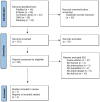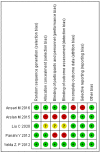Efficacy and Safety of Ginger on the Side Effects of Chemotherapy in Breast Cancer Patients: Systematic Review and Meta-Analysis
- PMID: 36232567
- PMCID: PMC9569531
- DOI: 10.3390/ijms231911267
Efficacy and Safety of Ginger on the Side Effects of Chemotherapy in Breast Cancer Patients: Systematic Review and Meta-Analysis
Abstract
Cancer is one of the leading causes of death in the world, with breast cancer being the most prevalent cancer. Chemotherapy-induced nausea and vomiting (CINV) is one of the most serious side effects of chemotherapy. Because the current CINV treatment option has several flaws, alternative treatment options are required. Ginger has traditionally been used to treat nausea and vomiting, and it also has anticancer properties in breast cancer cells. Based on these findings, researchers investigated whether using ginger to treat CINV in breast cancer patients is both effective and safe. We searched PubMed, Embase, Cochrane Library, CNKI, and Wanfang from inception to June 2022. Outcomes included Rhodes Index Scores of Nausea, Vomiting, and Retching, severity and frequency of CINV. Five RCTs were included. We pooled all included data and performed subgroup analysis by types of CINV. Overall, authors found that ginger was associated with a reduction in CINV. Subgroup and sensitivity analysis revealed that managing severity of acute CINV in breast cancer patients with ginger was efficient. In terms of managing delayed CINV in breast cancer patients, ginger was also statistically significant. The authors concluded that ginger may be helpful in lowering both acute and delayed CINV in breast cancer patients. Since there were no serious side effects, ginger is thought to be safe.
Keywords: breast cancer; chemotherapy; chemotherapy-induced nausea and vomiting; ginger; side-effect; zingiber officinale.
Conflict of interest statement
The authors declare that they have no conflict of interest.
Figures




Similar articles
-
Effect of ginger on acute and delayed chemotherapy-induced nausea and vomiting: a pilot, randomized, open-label clinical trial.Integr Cancer Ther. 2012 Sep;11(3):204-11. doi: 10.1177/1534735411433201. Epub 2012 Feb 7. Integr Cancer Ther. 2012. PMID: 22313739 Clinical Trial.
-
Phase II trial of encapsulated ginger as a treatment for chemotherapy-induced nausea and vomiting.Support Care Cancer. 2009 May;17(5):563-72. doi: 10.1007/s00520-008-0528-8. Epub 2008 Nov 13. Support Care Cancer. 2009. PMID: 19005687 Free PMC article. Clinical Trial.
-
Does the Oral Administration of Ginger Reduce Chemotherapy-Induced Nausea and Vomiting?: A Meta-analysis of 10 Randomized Controlled Trials.Cancer Nurs. 2019 Nov/Dec;42(6):E14-E23. doi: 10.1097/NCC.0000000000000648. Cancer Nurs. 2019. PMID: 30299420
-
Ginger as an antiemetic modality for chemotherapy-induced nausea and vomiting: a systematic review and meta-analysis.Oncol Nurs Forum. 2013 Mar;40(2):163-70. doi: 10.1188/13.ONF.163-170. Oncol Nurs Forum. 2013. PMID: 23448741 Review.
-
Effects of Ginger Intake on Chemotherapy-Induced Nausea and Vomiting: A Systematic Review of Randomized Clinical Trials.Nutrients. 2022 Nov 23;14(23):4982. doi: 10.3390/nu14234982. Nutrients. 2022. PMID: 36501010 Free PMC article. Review.
Cited by
-
6-Shogaol Inhibits the Cell Migration of Colon Cancer by Suppressing the EMT Process Through the IKKβ/NF-κB/Snail Pathway.Integr Cancer Ther. 2023 Jan-Dec;22:15347354231172732. doi: 10.1177/15347354231172732. Integr Cancer Ther. 2023. PMID: 37157810 Free PMC article.
-
Effectivity of oral ginger supplementation for chemotherapy induced nausea and vomiting (CINV) in children: A systematic review of clinical trials.J Ayurveda Integr Med. 2024 Jul-Aug;15(4):100957. doi: 10.1016/j.jaim.2024.100957. Epub 2024 Aug 21. J Ayurveda Integr Med. 2024. PMID: 39173346 Free PMC article. Review.
-
Nutraceuticals and biotics in pediatric gastrointestinal disorders.Eur J Clin Nutr. 2024 Feb;78(2):87-98. doi: 10.1038/s41430-023-01362-z. Epub 2023 Oct 24. Eur J Clin Nutr. 2024. PMID: 37875612 Review.
-
Gut aging: A wane from the normal to repercussion and gerotherapeutic strategies.Heliyon. 2024 Sep 12;10(19):e37883. doi: 10.1016/j.heliyon.2024.e37883. eCollection 2024 Oct 15. Heliyon. 2024. PMID: 39381110 Free PMC article. Review.
-
Application of Nanoparticles in Cancer Treatment: A Concise Review.Nanomaterials (Basel). 2023 Oct 31;13(21):2887. doi: 10.3390/nano13212887. Nanomaterials (Basel). 2023. PMID: 37947732 Free PMC article. Review.
References
-
- Adel N. Overview of chemotherapy-induced nausea and vomiting and evidence-based therapies. Am. J. Manag. Care. 2017;23((Suppl. 14)):S259–S265. - PubMed
-
- Natale J.J. Overview of the prevention and management of CINV. Am. J. Manag. Care. 2018;24((Suppl. 18)):S391–S397. - PubMed
-
- Wood D.E., Kazerooni E.A., Baum S.L., Eapen G.A., Ettinger D.S., Hou L., Jackman D.M., Klippenstein D., Kumar R., Lackner R.P., et al. Lung Cancer Screening, Version 3.2018, NCCN Clinical Practice Guidelines in Oncology. J. Natl. Compr. Cancer Netw. 2018;16:412–441. doi: 10.6004/jnccn.2018.0020. - DOI - PMC - PubMed
Publication types
MeSH terms
Substances
Grants and funding
LinkOut - more resources
Full Text Sources
Medical

